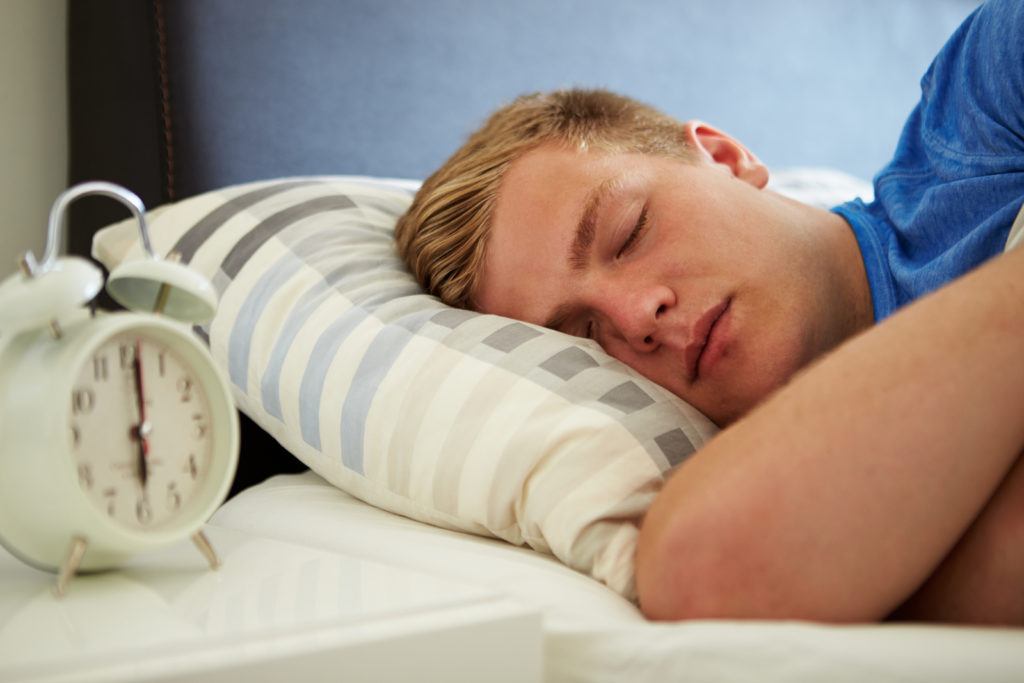
Last night I slept for seven whole hours — that’s seven hours without waking up. It’s pretty darned close to miraculous. Can you identify? If you’re like me, most nights include one or more of the following: a brain that won’t shut down, waking up for a bathroom run, or the constant chatter of concerns and to-do lists. Of course, I can’t do anything about them at 3:00am. Add to that the nights when I just give up trying to fall asleep again, get out of bed, keep busy for a couple of hours, and then try again.
The truth is that most of us are sleep deprived, and that includes our tween and teen children. Technology, light, food, stress, exercise and more… they all affect how long it takes to fall asleep and stay asleep. You know how lack of sleep affects your overall mood, functioning and effectiveness. Your teenager, already in the throes of adolescent stress and drama, is impacted even more. In addition, at the time when they most need more sleep, their internal clock has them staying awake later and going to school earlier – not a recipe for a cheery, enthusiastic child, learner or friend.
This week I’m reprinting from an article on Refinery 29, “16 Evening Habits that Make Everything Better”. Read on and try at least one. All you have to lose is… nothing much, except for a dragging, cranky you. Do you have any tips to share? Leave them below. We could all use a little extra sleep!
Ready to become a morning person? Since your circadian clock is largely set by exposure to light, body temperature, exercise and food, the following science-backed tips will help you log quality sleep… Your better morning awaits.
Turn off your gadgets at least two hours before bed.
Per the National Sleep Foundation’s “Sleep in America” poll, an overwhelming amount of Americans spend time on their electronics within an hour of bedtime, multiple times per week. Tsk tsk. Within two hours of bedtime, your SCN sends a signal to the pineal gland to begin producing melatonin, the hormone that helps control your sleep-wake cycle, Dr. Terman says. And, research published in Applied Ergonomics shows that just two hours of exposure to a bright tablet screen at night can suppress the body’s melatonin levels by about 22%.
Cut out blue light.
If you are going to have your computer open, try using the f.lux software, Dr. Terman advises. It tracks the cycle of the sun in your time zone and latitude, and then adjusts your gadget’s levels of blue light to match. Or, you could dim your device. A recent Mayo Clinic study found that dimming the brightness to about 50% keeps blue light low enough to not interfere with sleep.
Chow down as soon as you wake up.
Humans have evolved to switch their day-night cycles according to when they eat, suggests research from Beth Israel Deaconess Medical Center. Bonus: Eating breakfast fires up your metabolism, and the earlier you get it humming along, the better.
Make your late-night snack carb-rich.
Research published in the journal Cell Reports found that in mice, eating a carbohydrate-rich snack in the evening helped reset the body’s internal clock. Why carbs? Insulin affects the body’s sleep-regulating gene PER2, and since carbs boost insulin secretion, they also help regulate your cycles — so you’re drowsy when you should be. Try cereal with milk (this combo is high in carbs and tryptophan, which converts to serotonin and melatonin in the brain), or cherries (which contain both carbs and melatonin), Dr. Winter says.
Take a bath before bed.
This trick is not just to relax. You want to try raising your core body temperature — so that it can plummet when you get out of the tub. The body’s temperature naturally falls come sleepytime, so by exaggerating that temperature change you may sleep more easily, Dr. Winter says. Try taking a hot (like, as hot as you can stand) bath for 15-plus minutes and then get into light PJs.
Exercise at the same time every day.
People who regularly exercise sleep better, but if you exercise at the same time every day, you get even more benefits, Dr. Winter says. Your circadian clock uses clues such as when you exercise to determine when you should go to bed and wake up. It thinks, Okay, we’re exercising now, and we go to bed X-number of hours after working out, so let’s get ready.
